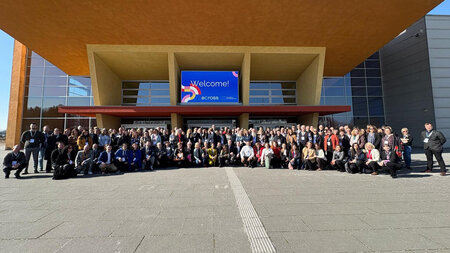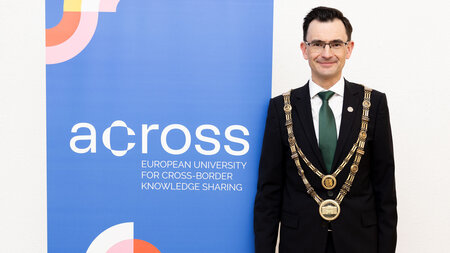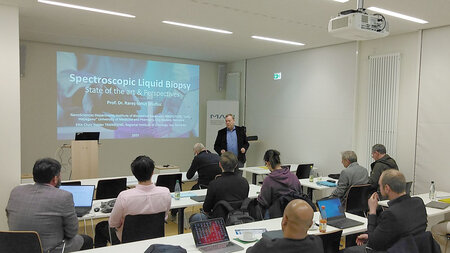Emigration in Focus
Prof. Dr. Birgit Glorius from the Institute for European Studies and European History took part as a migration expert at a conference in Dushanbe, the capital of Tajikistan
-

A part of the Central Asian and international delegations pose in front of the Tajik National Museum in Dushanbe, including Prof. Dr. Birgit Glorius (1st row, middle). Photo: private
On 16 and 17 September, Prof. Dr. Birgit Glorius, from the Professorship for European Studies and European History (german) at Chemnitz University of Technology, at the invitation of the Organisation for Economic Cooperation and Development (OECD) and the National Bank of Tajikistan, took part in a conference in the Tajik capital of Dushanbe. The conference, and its ensuing workshop, brought together financial experts from Central Asia to jointly discuss strategies for “financial literacy” and “financial education”. These terms include aspects of financial education, individual household management and financial planning, and savings and investment strategies, as well as more complex issues such as tax systems or pension schemes. Following the global crisis of 2008, the OECD launched a new programme that supports the development of national strategies for education in the areas of economics and finance. The goal of the programme is not only to promote the building of individual skills in the area of finance, but also to make an overall contribution to the financial stability and financial development of the country.
The conference promoted networking among Central Asian states, and sparked a lively exchange of knowledge, various projects, and education strategies in the area of economics. Glorius’s role as an expert in the area of migration focused the attention of conference participants on the needs of migrants. All Central Asian countries are heavily affected by emigration. In 2018, about 480,000 people emigrated from Tajikistan, mostly to Russia and Kazakhstan. Money that they send back makes up between 30 and 50 percent of gross domestic product each year. This makes migrants and their remittances a very important focus for questions of economic education and inclusion. However, this group is also a very vulnerable one. Many migrant workers work illegally in their destination countries, often in dangerous or precarious jobs. Their income is also subject to heavy fluctuation, making financial investments quite difficult to plan. Nevertheless, there is also a lot of potential to be seen from the point of view of the countries of origin.
Using the example of migration processes within the European Union, Glorius highlighted the diversity of transnational relationships between mobile and non-mobile populations, as well as the opportunities afforded to amass knowledge and capital in the country of origin, through the process of remigration. Obstacles to the successful return of emigrants include a lack of information, and a lack of attunement with the current daily life in the country of origin. In many cases, as the data from intra-European migration shows, the hurdles for returning emigrants seem higher from the outside than they actually are once they return to their homeland. Nevertheless, a successful return and reintegration requires careful preparation. Therefore, according to Glorius, government support programmes should already start prior to departure and continue to ensure a regular flow of information and advice during emigration, in order to support the future re-integration of emigrants into the domestic economic system well before they actually return.
(Author: Mario Steinebach / Translation: Jeffrey Karnitz)
Matthias Fejes
27.09.2019





